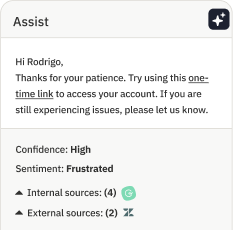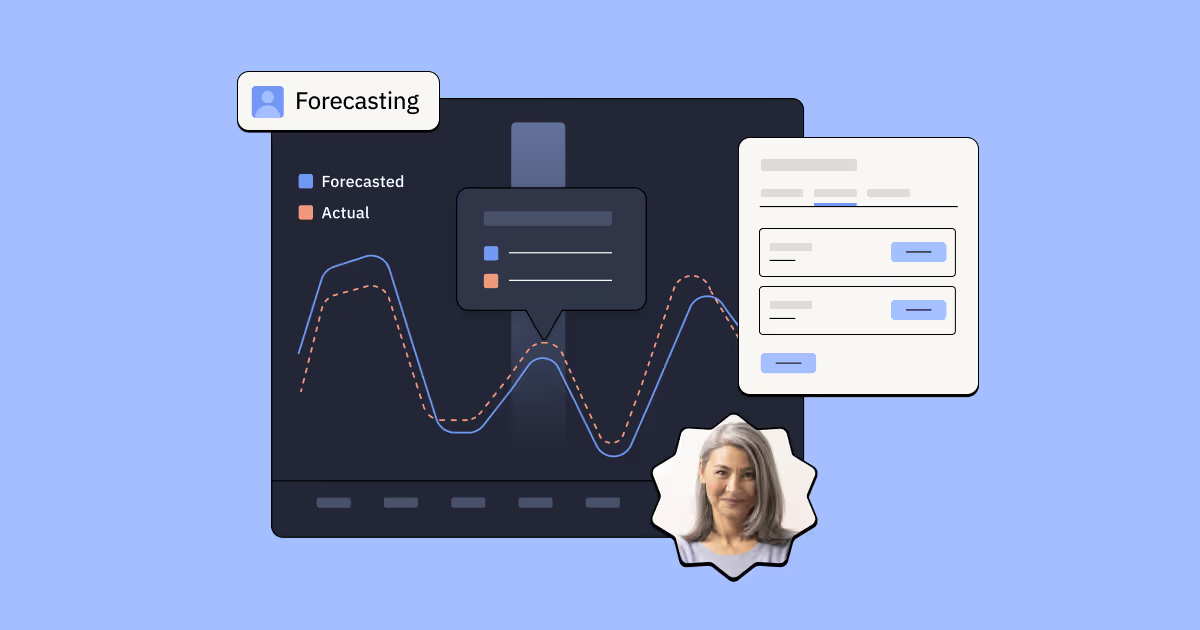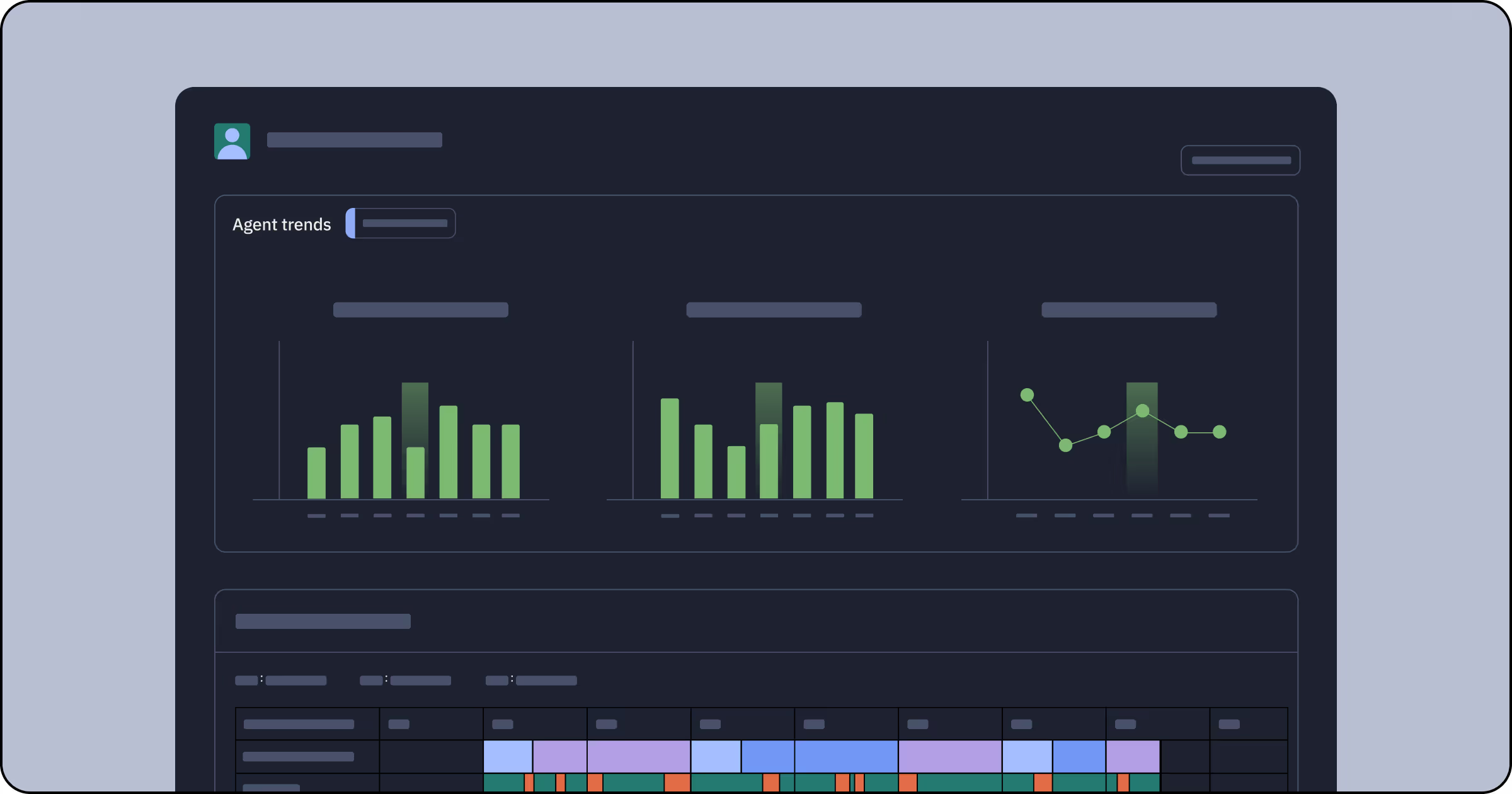How AI agents for call centers are transforming support

Customer support teams are facing a growing crisis: increased ticket volumes, limited resources, and escalating agent burnout. Traditional support models — often reliant on outdated tools and manual workflows — struggle to keep pace with rising customer expectations. The result? Slower response times, inconsistent service quality, and missed SLAs that leave both customers and agents frustrated.
Enter AI-powered call center agents: intelligent, automation-driven solutions designed to streamline workflows, enhance agent productivity, and deliver faster, more consistent support across channels.
These AI agents leverage machine learning and automation to handle routine inquiries, suggest contextual responses, and optimize case resolution — all while seamlessly integrating into existing support platforms.
As AI continues to reshape the future of customer service, the key trends driving adoption include:
- Automation at scale: AI agents resolve repetitive inquiries instantly, freeing up human agents for more complex tasks.
- Seamless omnichannel integration: AI-powered systems work across chat, email, voice, and internal tools like Slack, ensuring smooth transitions between support channels.
- Enhanced resolution speed: Intelligent AI workflows reduce handling times, preventing backlogs and SLA breaches while maintaining personalized, high-quality support.
- Scalability for global support: AI agents break language barriers with automatic translation and provide 24/7 support, enabling businesses to serve customers across time zones and regions without scaling human headcount.
With these advancements, AI agents aren’t just supporting call centers — they’re redefining them, enabling teams to scale efficiently, improve agent well-being, and consistently deliver top-tier customer experiences.
The evolution of AI in call centers
AI in customer support isn’t a new concept, but its capabilities have evolved significantly over the years. Early AI applications in call centers focused on simple automation — think interactive voice response (IVR) systems and basic chatbots that followed pre-programmed scripts. While these solutions helped manage call routing and FAQs, they lacked the intelligence to understand context, adapt to customer needs, or integrate seamlessly with other support tools.
Fast forward to today, and AI has become far more than just a ticket deflection tool. The rise of machine learning, natural language processing (NLP), and predictive analytics has transformed AI into a true workforce ally — one that enhances both agent efficiency and customer satisfaction. Modern AI-powered call center solutions now include:
- Omnichannel AI Agents: These intelligent assistants operate across chat, email, voice, and internal collaboration tools like Slack, ensuring a seamless customer experience across platforms.
- AI Copilots: Instead of replacing human agents, AI copilots suggest responses, surface relevant data in real time, and reduce cognitive load so agents can focus on higher-value interactions.
- Automated Workflow Management: AI optimizes case routing, prioritizes urgent tickets, and even initiates self-service resolutions before a human agent steps in.
As a result, call centers are evolving beyond traditional support functions into customer experience hubs, where AI helps agents work smarter, not harder. Companies like aXcelerate and Tithely have already leveraged AI to scale support operations — reducing training time for new agents by 50% and cutting average handle time by up to 26%, respectively.
This shift isn’t just about efficiency — it’s about enhancing the human experience. AI-powered contact centers ensure that customers get fast, accurate support while empowering agents with the tools they need to be more effective and engaged in their work.
What makes an AI agent a must-have solution for modern call centers?
AI-powered agents are no longer just a nice-to-have — they’re a critical component of a high-performing call center. In a world where 86% of customers expect seamless support across channels and businesses risk losing up to $75 billion annually due to poor customer service, failing to integrate AI into support operations is becoming a competitive disadvantage.
Companies that have embraced AI-driven automation are already seeing significant benefits. Thrasio, for example, automated 53% of customer interactions, reducing first response times from 1 hour to under 20 minutes while improving CSAT from 87% to 97%. Honeylove saw a 54% increase in agent productivity after implementing AI support, reducing escalations by 20%. These aren’t just efficiency gains — they’re competitive advantages that set brands apart.

Automating across every channel
Modern customers expect seamless, omnichannel support — whether they’re reaching out via chat, email, or phone. AI agents eliminate repetitive manual tasks, handling inquiries like order status updates, password resets, and refund requests with instant, accurate responses.
Platforms like Assembled Assist take this further by ensuring consistent, AI-powered resolutions across multiple channels. Tithely, for example, reduced chat handle times by 26% and saw a 205% increase in solved cases after implementing AI-powered automation, allowing agents to focus on more complex customer needs.
Seamless integration for better support
AI technology isn’t just about automation — it’s about empowering teams with better data. A truly effective AI agent integrates seamlessly with existing support platforms, pulling relevant customer history, order details, and interaction logs without requiring agents to switch between multiple tools.
Assembled Assist, for example, integrates with tools like Zendesk, Salesforce, and Slack, ensuring that AI-powered insights are always available where agents need them. This boosts collaboration across teams, making it easier to share knowledge, escalate tickets efficiently, and provide faster resolutions.
AI-enhanced resolution speed
Speed matters. Customers are 2.4x more likely to stay loyal to a brand when their issues are resolved quickly, and AI agents play a key role in reducing response and resolution times.
AI-powered tools like Assist AI Copilot provide:
- Real-time reply suggestions based on past resolutions and customer history.
- Instant data lookups so agents don’t waste time searching for information.
- Predictive analytics to anticipate customer needs and recommend the best course of action.
These capabilities increase first-call resolution rates, prevent SLA breaches, and clear ticket backlogs, all while delivering faster, high-quality support. Lulu and Georgia exemplify this impact — by leveraging AI-powered automation, they cut first response times by 22% and boosted overall resolution efficiency by 18%.

Always-on operational efficiency
Unlike human teams, AI agents don’t sleep. They provide 24/7 support, handling inquiries outside of business hours, preventing backlog buildup, and ensuring that global teams can operate without delays or downtime.
This always-on efficiency doesn’t just improve customer experience — it directly impacts the bottom line. By automating routine support tasks, AI reduces the need for additional staffing during peak periods, leading to cost savings without sacrificing service quality. In fact, companies like Thrasio have saved $1.8 million by implementing AI-powered automation.
How to use AI agents to transform your call center operations
AI-powered agents aren’t just about automation — they’re about revolutionizing how support teams operate. By integrating AI-driven solutions, businesses can scale efficiently, boost agent productivity, and enhance customer satisfaction without increasing complexity.
Assembled, a leader in contact center AI solutions, offers a suite of tools designed to help support teams work smarter. Below, we’ll break down key AI-driven features and how to use them to maximize efficiency and customer experience.
Deliver seamless, omnichannel support with AI agents
Support today is no longer limited to a single channel — customers expect consistent, high-quality service across chat, email, voice, and internal tools like Slack. The Assist Omnichannel AI Agent enables teams to:
- Automate resolutions across multiple channels, ensuring consistent, always-on support.
- Seamlessly integrate with existing systems to handle complex inquiries while maintaining brand voice.
- Reduce ticket backlog and SLA breaches, providing faster, more effective customer interactions.
How to use it: Implement Assist Omnichannel AI Agent to handle repetitive queries like order status updates and refunds, freeing up human agents for higher-value issues.
Boost agent productivity with AI copilot
AI isn’t just for automating responses — it’s a powerful tool for enhancing agent performance. The Assist AI Copilot helps agents work smarter by:
- Suggesting AI-powered replies to speed up response times while maintaining accuracy and personalization.
- Providing instant data lookups, so agents don’t waste time switching between tools.
- Offering real-time guidance to ensure consistent and high-quality resolutions.
- Automatically translating tickets so agents can work with any customer in any language.
How to use it: Enable AI Copilot to auto-draft responses for agents based on support documentation and historical interactions, reducing response times and cognitive load.
Automate workflows for smoother operations
One of the biggest challenges in call centers is managing complex workflows — from ticket escalations to returns. Assembled’s AI Workflow Builder allows teams to:
- Automate repetitive workflows using plain language and visual previews to look up customer data and take action within internal tools.
- Adapt in real time to spikes in ticket volumes and changing customer needs.
- Ensure smooth escalations and handoffs, improving efficiency and customer satisfaction.
How to use it: Set up workflow automations for common escalations (e.g., VIP customer complaints) to reduce handling times and agent workload.
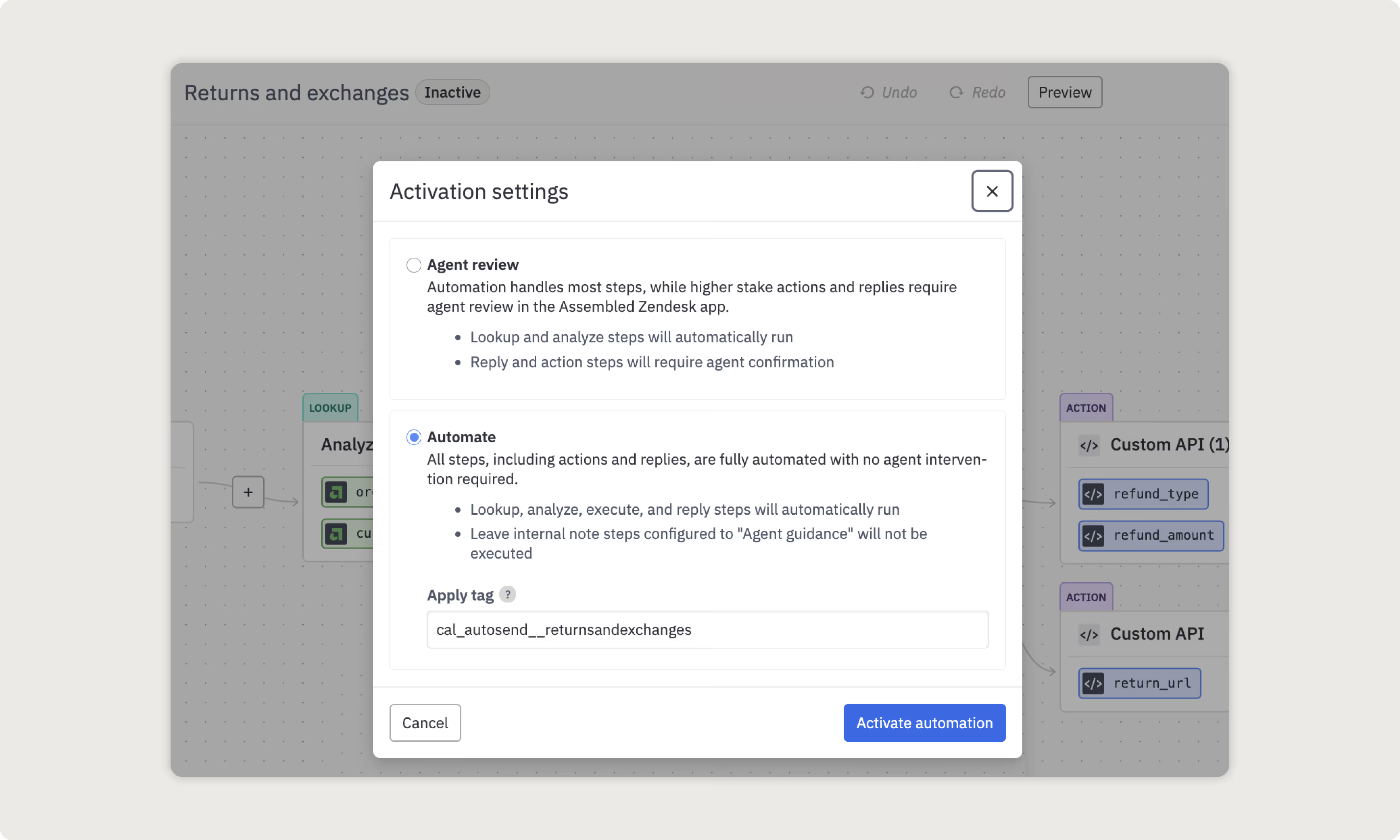
Optimize staffing with AI-powered scheduling
Balancing agent availability with peak demand is critical for maintaining SLAs and preventing burnout. Assembled’s scheduling tool uses AI-powered forecasting to:
- Predict staffing needs based on historical data and real-time demand fluctuations.
- Ensure the right agents are available at the right time, reducing overstaffing or understaffing risks.
- Prevent burnout by balancing workloads, leading to happier and more productive agents.
How to use it: Utilize Assembled’s AI-driven scheduling to ensure coverage during peak hours without increasing headcount.
Make data-driven decisions with AI reporting
Support operations thrive on clear, actionable insights. Assembled’s AI-powered reporting and Assist Scorecard help teams:
- Monitor AI accuracy and performance, ensuring AI-driven responses meet quality standards.
- Analyze historical performance trends to identify bottlenecks and optimization opportunities.
- Make smarter workforce decisions based on real-time and predictive analytics.
- Categorize incoming cases to unlock new automation opportunities or knowledge gaps.
How to use it: Use the Assist Scorecard to track AI effectiveness and make data-backed improvements to customer support strategies.
Best practices for implementing AI in call centers
Implementing AI in a call center isn’t a one-size-fits-all process. Each support operation has unique workflows, customer expectations, and agent needs, which means AI adoption should be tailored to specific challenges and goals. While AI-powered automation can transform efficiency and customer experience, a strategic approach ensures maximum impact with minimal disruption.
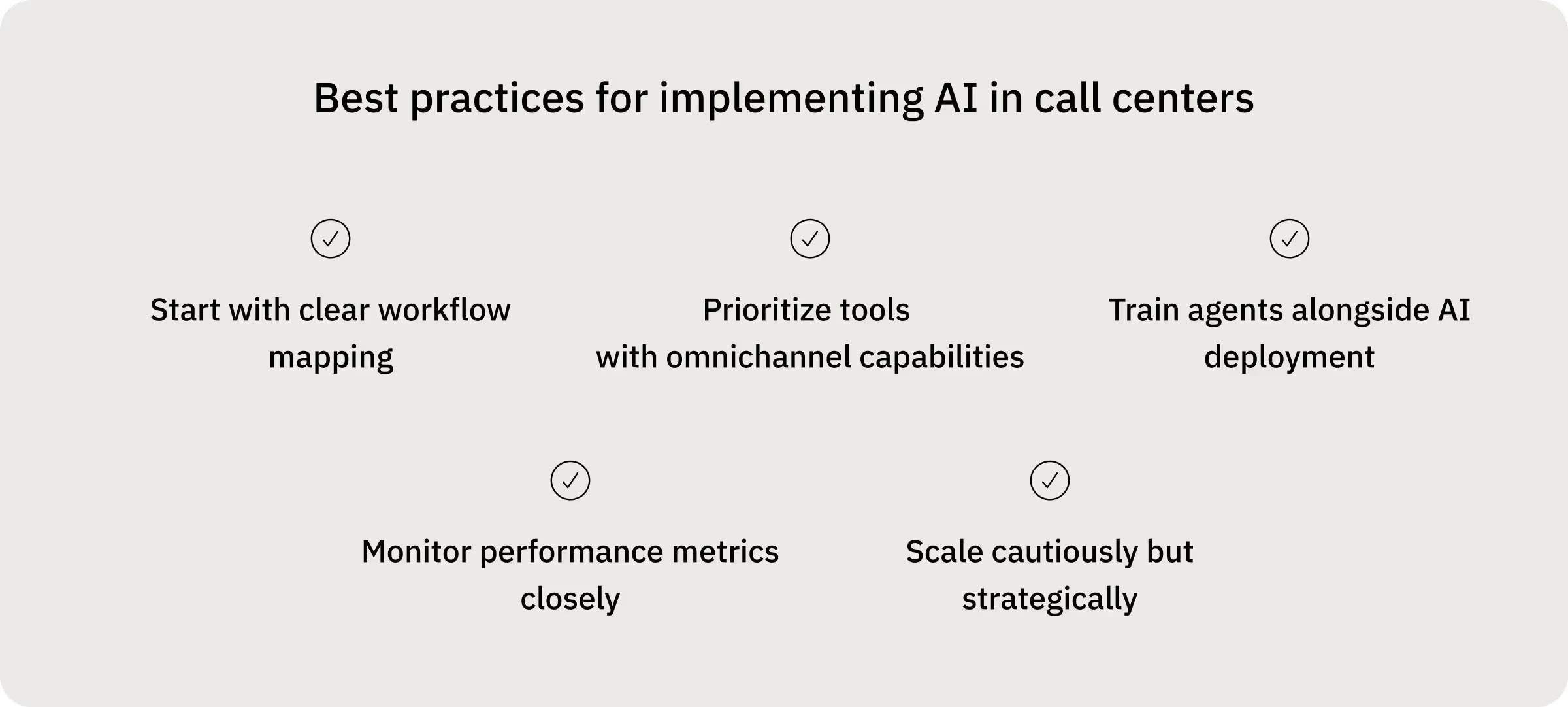
Start with clear workflow mapping
Before deploying AI, identify areas of inefficiency within your current operations. Which tasks slow down agents? Where do customers face the most friction? Mapping out these workflows ensures that AI is implemented where it delivers the most value, rather than applying automation haphazardly.
Best practice:
- Engage frontline agents in this process — they have direct insight into daily bottlenecks.
- Analyze historical data (e.g., long resolution times, high escalation rates) to pinpoint areas for AI intervention.
- Prioritize AI for repetitive, high-volume tasks (e.g., password resets, order status updates) to free up agents for complex inquiries.
Prioritize tools with omnichannel capabilities
Customers today expect seamless support across multiple channels — chat, email, and voice. AI solutions like Assembled Assist unify these interactions, ensuring consistent service quality regardless of where a customer reaches out.
Best practice:
- Choose an AI agent that integrates with your existing CRM and ticketing platforms to avoid data silos.
- Ensure AI maintains brand consistency across channels, using tools like Assist AI Copilot to provide agents with context-aware, personalized responses.
- Implement AI for real-time handoffs between automated systems and human agents to create a smooth customer journey.
Train agents alongside AI deployment
AI is most effective when agents know how to use it as a tool rather than seeing it as a replacement. Proper training helps teams trust AI suggestions, understand how to optimize responses, and feel empowered rather than threatened by automation.
Best practice:
- Conduct role-specific training so that different teams (e.g., frontline agents, supervisors, and real-time analysts) know how to leverage AI in their daily work.
- Use sandbox environments to allow agents to practice with AI-suggested replies and automated workflows before deploying them live.
- Encourage ongoing feedback from agents on AI-generated responses, helping refine accuracy and ensuring brand alignment.
Monitor performance metrics closely
The success of AI in a call center isn’t just about automation — it’s about measurable improvements in efficiency and customer satisfaction. Tracking the right KPIs helps teams adjust AI workflows, fine-tune automation, and ensure continued performance gains.
Best practice:
- Track resolution times, SLA adherence, and AI accuracy rates using tools like Assembled’s Assist Scorecard.
- Monitor CSAT and NPS scores to ensure AI interactions enhance — not hinder — customer experience.
- Use AI-powered analytics to detect trends in ticket escalation rates, first-call resolution, and agent productivity.
Scale cautiously but strategically
Rather than applying AI across all workflows at once, a phased approach reduces risk and maximizes learning opportunities. Starting small allows teams to optimize AI configurations, refine automation, and ensure agent buy-in before full-scale deployment.
Best practice:
- Pilot AI solutions in specific areas (e.g., self-service chatbots for FAQs or AI-assisted agent replies for email inquiries) before rolling them out broadly.
- Expand gradually, monitoring KPIs and gathering feedback at each stage.
- Ensure AI scaling aligns with business growth, adjusting automation rules to match seasonal demand or evolving customer behaviors.

Examples of AI agents in support operations
Implementing AI agents in customer support has led to significant improvements in efficiency, cost savings, and customer satisfaction. Below are real-world examples from companies that have partnered with Assembled to enhance their support operations.
Honeylove increases productivity by 54%
Honeylove, a rapidly growing e-commerce brand, faced challenges in managing escalating customer inquiries. By integrating Assembled Assist, they automated routine tasks and provided agents with AI-driven insights. This led to a 54% increase in solves per hour and a 20% reduction in ticket escalations, enabling their support team to handle higher volumes without compromising quality.
Thrasio saves $1.8 million annually
Thrasio, managing a vast portfolio of e-commerce brands, needed to streamline their support operations. With Assembled Assist, they automated 53% of customer interactions, reducing first response times from one hour to under 20 minutes. This efficiency resulted in annual cost savings of $1.8 million and an increase in customer satisfaction scores from 87% to 97%.
Tithely reduces average handle time by up to 26%
Tithely, a SaaS provider for churches, sought to enhance their support efficiency. Implementing Assembled Assist led to an 11% improvement in average handle time for email and a 26% improvement for chat. Power users of Assist saw a 23% increase in cases solved for email and a remarkable 205% increase for chat, significantly boosting their support team's productivity.
aXcelerate cuts training time in half for new support agents
aXcelerate, an Australian training management software provider, aimed to reduce the ramp-up time for new support agents. By utilizing Assembled's AI-powered copilot, they halved the training period, expanded their talent pool, and increased employee engagement with user-friendly AI tools.

Lulu and Georgia cuts first response times by 22%
Home décor retailer Lulu and Georgia wanted to enhance their customer support responsiveness. Through Assembled Assist's auto-send feature, they achieved a 22% decrease in first response time and an 18% reduction in the time from first assignment to solution over nine months. Improved case categorization also ensured high-urgency issues were prioritized and routed to the appropriate teams more efficiently.
These case studies demonstrate the tangible benefits of integrating AI agents into support operations, including increased productivity, cost savings, reduced handling times, expedited agent training, and improved response times.
Get Assembled’s AI agent for every support channel
Customer expectations are higher than ever, and traditional support models simply can’t keep up. Without automation, contact centers face longer resolution times, frustrated agents, and missed SLAs — all of which put businesses at a competitive disadvantage. AI-powered solutions aren’t just a luxury; they’re essential for scaling efficiently, improving service quality, and staying ahead of the competition.
Why Assembled?
Assembled Assist is built for the modern contact center, offering seamless AI-powered support across every channel. Here’s what makes it the go-to solution:
- True omnichannel support: Deliver fast, consistent service across chat, email, voice, and internal tools like Slack with an AI agent that adapts to every platform.
- Effortless integrations: Works within your existing tech stack, connecting with CRMs, ticketing platforms, and internal knowledge bases to provide agents with real-time insights.
- Enhanced agent productivity: Automate routine inquiries, provide AI-powered reply suggestions, and free up human agents to focus on more complex, high-value interactions.
- Smart, scalable automation: Prevent SLA breaches, clear ticket backlogs, and maintain 24/7 support — all without increasing headcount.
Companies like Honeylove, Thrasio, Tithely, aXcelerate, and Lulu and Georgia have already transformed their operations with AI-powered automation, reducing handle times, increasing productivity, and driving millions in cost savings.
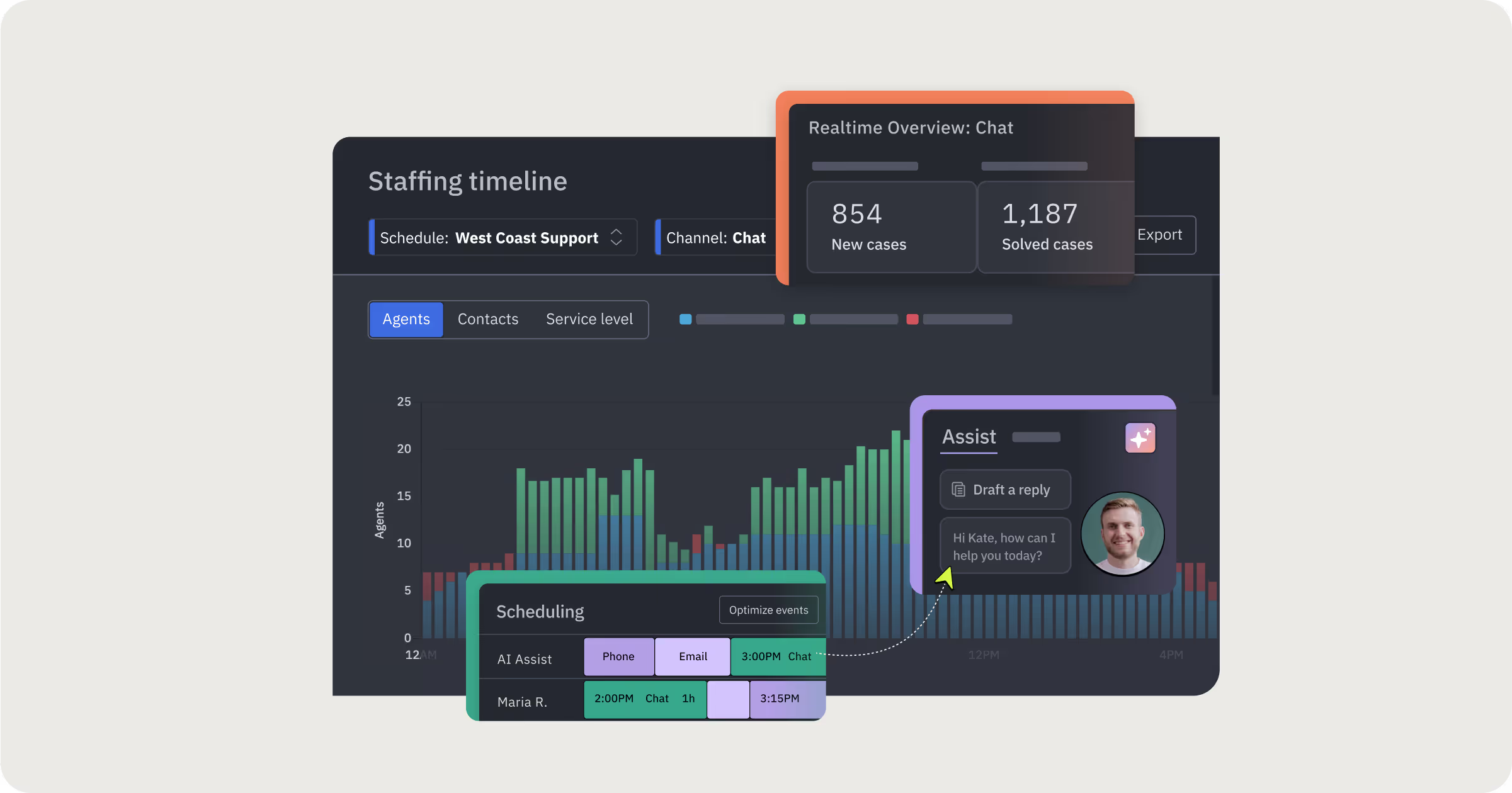
See Assembled Assist in action
AI-powered customer support isn’t the future — it’s the now. The best teams are already leveraging AI to reduce inefficiencies, improve response times, and enhance customer satisfaction. Ready to see how Assembled Assist can help you transform your contact center?

